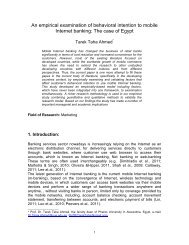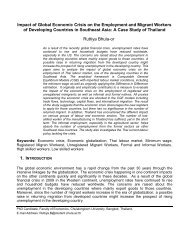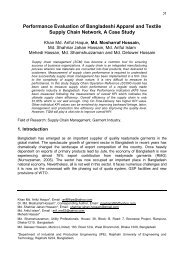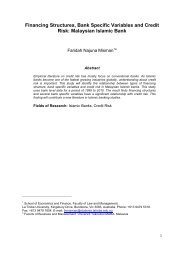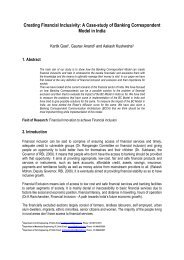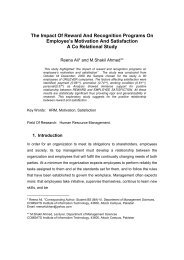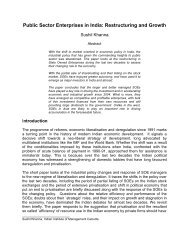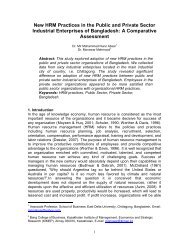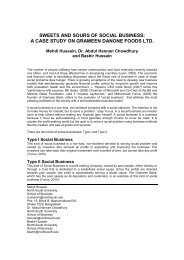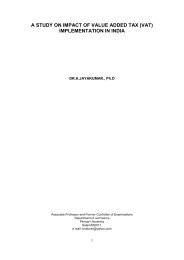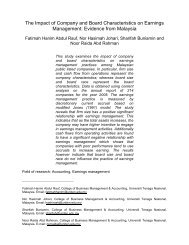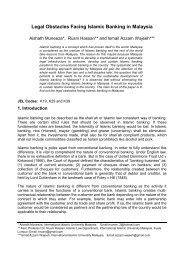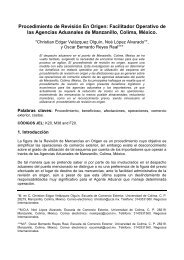Leadership Wisdom: Lessons from Sikhism
Leadership Wisdom: Lessons from Sikhism
Leadership Wisdom: Lessons from Sikhism
You also want an ePaper? Increase the reach of your titles
YUMPU automatically turns print PDFs into web optimized ePapers that Google loves.
of the new age. It is an egalitarian religion which preaches a message of love, devotion,truthful living, liberty, equality, fraternity and remembrance (Simran) of God at all times.It is a universal faith with a message of peace and prosperity for the whole world. It is alife affirming faith with positive attitude and high spirits. It is heartfelt adoration, devotionand surrender to one God. It is a thoroughly modern and progressive religion whichevolved in India as a solution to the catastrophe that plagued Indian society in thefifteenth century.According to Joseph Davey Cunningham (1812-51), the first British historian ofthe Sikhs, “The credit goes to Guru Nanak that he introduced real reforms and laid thefoundation on which his successor, the tenth Sikh Master, Guru Gobind Singh created anew nation. Guru Nanak saved his followers <strong>from</strong> those shortcomings to which thedisciples of many other religions had been falling a prey to for centuries. He taught thepeople worship of God and purity of character. In this way, he started a new religionwhich was simple, independent, non-communal and free <strong>from</strong> rites and rituals (A Historyof the Sikhs).”Max Arthur Macauliffe, an eminent English scholar and historian in his famousbook “The Sikh Religion”, opines, “The Sikh religion differs as regards the authenticity ofits dogmas <strong>from</strong> most other great theological systems. Many of the great teachers theworld has known, have not left a line of their own composition, and we know what theytaught only through tradition or second-hand information. If Pythagoras wrote any of thetenets, his writings have not descended to us. We know the teachings of Socrates onlythrough the writings of Plato and Xenophon. Buddha has left no written memorials of histeaching. Kungfu-tze, known to Europeans as Confucius, left no documents in which hedetailed the principles of his moral and social systems. The founder of Christianity didnot reduce his doctrines to writing, and for them we are obliged to trust the Gospelsaccording to Matthew, Mark, Luke, and John. The Arabian Prophet did not himselfreduce to writing the chapters of the Quran. They were written or compiled by hisadherents and followers. But the compositions of the Sikh Gurus are preserved and weknow firsthand what they taught.”According to <strong>Sikhism</strong>, man's salvation lies not only in his faith, but also in hischaracter and his eagerness to do active good. "Life without virtue runs to waste," saysGuru Nanak. The Guru gives practical tips to achieve the goal. Every Sikh is expectedto replace lust, anger, greed, undue worldly attachment and pride with their virtuouscounterparts, self-control, forgiveness, contentment; love of God and humility beforedeciding to go to the next step of doing active good. It is like sweeping the floor. As arule; where the broom does not reach, the dust will not vanish off itself. "The new thingwill fill the vessel only if the existing one is wiped out," says the Guru.6. Scope and Methodology of the Study:The World Economic Forum, which is an active independent internationalorganisation committed to improving the state of the world by engaging business,political, academic and other leaders of society to shape global, regional and industryagendas, in its 2005 meet of various leaders <strong>from</strong> business, academia and governmentidentified and agreed upon six top priority guiding values (traits) to be inculcated among
should earn one‟s living by honest means, share one‟s earnings with the needy andkeep God Almighty – the Creator always in one‟s mind – that is to be always thankful toHim” and “Speaking falsehood, one eats poison, and the evil within increases greatly.”The persons who are lost in falsehood create the environment of distrust and suspicionand modesty and Dharma are far <strong>from</strong> them and “They drown themselves, and drowntheir entire family; speaking lies, they eat poison. On the other hand, those who practicetruth, they reap the real profits, abiding in the Will of God.” The Guru Says: “Those whowalk on the Path of Truth shall be praised throughout the world. Be kind to all beingsthisis more meritorious than bathing at the sixty-eight sacred shrines of pilgrimage andthe giving of charity.” The Guru questions: “If one's clothes are stained with blood, thegarment becomes polluted. Those who suck the blood of human beings-how can theirconsciousness be pure?” (SGGS,140). The leaders must keep in mind that without theGuru, there is no spiritual wisdom; without Dharma, there is no meditation. WithoutTruth, there is no credit; without capital, there is no balance (SGGS,1411).The Guru guides, “Make true commerce and gain the objective of life. Then intoregret shall you not fall. Discard false traits, practise goodness. In the soil ofrighteousness, cast the seed of truth- be such your cultivation. Thus shall you be knownas a good merchant and carry away true gain”(SGGS,148). And “Those who havetruth as their fast, contentment as their sacred shrine of pilgrimage, spiritual wisdomand meditation as their cleansing bath, kindness as their deity, and forgiveness astheir chanting beads- they are the most excellent people” (SGGS,1245). The Guruasserts that one will secure a safe position in the Court of the Almighty only by dealingsin truth and thus, concludes, “Deal in true trade, O Trader and Your Merchandise will besafe in the court of the Lord” (SGGS,293).7.2 The Value of Compassion:The leader should be a manifestation of compassion. The pains, sufferings,sorrows and grief of others must be felt by him as his own and he should try his best toeliminate or lessen them. The word compassion itself denotes the passion for thecolleagues. „Love for others what you love for yourself‟ is the universal golden rule. Thevirtues of compassion, consideration, giving, sharing, kindness and love are such asmake the life not only meaningful but worth living also. The consideration for others isinherent in the moral teachings of Sri Guru Granth Sahib. “Truth, contentment,compassion, religious faith and purity - I have received these <strong>from</strong> the Teachings of theSaint, Says Nanak, one who realizes this in his mind, achieves total understanding”(SGGS, 822). Sri Guru Granth Sahib describes the blissful state: “To be imbued andattuned to the Word of the Lord; to be kind and compassionate; to sing the songs of theLord's Praises - these are the most worthwhile actions in this Dark Age of Kali Yuga(SGGS,1354).” It further guides, “Let spiritual wisdom be your food, and compassionyour attendant” (SGGS,6). And “Purity, contentment, compassion, faith and truthfulness- I have ushered these into the home of myself” (SGGS,379).The desire and ability of the leaders should always be to ameliorate the plight ofthe people employees working for the business. Businesses are most successful whenthe leaders are not merely concerned with their interests (sales, profits, success), butwith the concerns of the stakeholders. Total concern for employees brings the business
married. Woman becomes his friend; through woman, the future generations come.When his woman dies, he seeks another woman; to woman he is bound. So why callher bad? From her, kings are born. From woman, woman is born; without woman, therewould be no one at all” (SGGS,473).7.4 The Value of Tolerance:Tolerance is the acceptance of diversity of opinion, social, ethnic, cultural andreligious. It is the ability to listen and accept others, valuing the different ways ofunderstanding and position in life, provided they do not violate the rights of others. Iftolerance is understood as respect and consideration for the difference, as a provisionto admit other ways of being and acting than their own, or as an attitude of acceptanceof legitimate pluralism, it is clearly a virtue of paramount importance for leaders. GuruNanak, The founder of <strong>Sikhism</strong>, preached the message of love and tolerance andopposed the caste system and taught social justice, peaceful co-existence and worldconcern. <strong>Sikhism</strong> is known as the religion of harmony, brotherhood and tolerance. Themost sacred site of <strong>Sikhism</strong> Sri Harmandir Sahib also known as Golden temple hasdoorways on all four sides which symbolizes the tolerance of <strong>Sikhism</strong> – greeting all fourreligions with open arms.Sri Guru Granth Sahib says, “With tolerance, humility, bliss and intuitive poise,they continue to meditate on the Lord, the Treasure of excellence”(SGGS,253). Itadvises that faith, contentment and tolerance are the food and provisions of the angels.They obtain the Perfect Vision of the Lord, while those who gossip find no place of rest(SGGS, 83). It advocates that he Saints are tolerant and good-natured; friends andenemies are the same to them. (SGGS,1356). It implies that leaders must not bereactive but they should behave in a saintly manner and be pro-active. They shouldpossess the patient endurance of trees like humble devotees. (SGGS,1381) Sri GuruGranth Sahib propagates the extreme level of tolerance when it says, “Fareed, do notturn around and strike those who strike you with their fists. Kiss their feet, and return toyour own home” (SGGS,1378).7.5 The Value of Selflessness:Selflessness is about being humble and compassionate. Selflessness lets onededicate his life to helping others. Selflessness is the quality of not putting yourself firstbut being willing to give your time or money or effort etc. for others. It is concerned morewith the needs and wishes of others than with one's own. It focuses on a motivation tohelp others or a want to do good without reward. Selfless service to humanity is aunique concept in <strong>Sikhism</strong>. Selfless Service (Nishkam Seva) is the willingness tosacrifice selfish desires for the benefit of larger interest of others as an indication of loveand commitment. One who is involved in the selfless service of others does not suffer<strong>from</strong> grief to that degree as a person would suffer who is not busy is any such selflessnoble job. The cultivation and practice of selfless service which is termed as NishkamSeva in Gurbani or the Sikh Scriptures - attract God's grace and when He bestows Hisfavor, the Holy Name comes to dwell in that person who performs such service. SriGuru Granth Sahib says, “One who performs selfless service, without thought of reward,
shall attain his Lord and Master”(SGGS-286) and “Through selfless service, eternalpeace is obtained. The Gurmukh is absorbed in intuitive peace”(SGGS,125).According to Sri Guru Granth Sahib, “That is selfless service, which pleases God,and which is approved by God” (SGGS, 757). Sri Guru Granth Sahib advises, “Centeryour awareness on seva-selfless service-and focus your consciousness on the Word ofthe Shabad” (SGGS,110) because “Selfless service is the support of the breath of life ofthe Gurmukh”(SGGS,229). Without selfless service, no one obtains any reward(SGGS,354) but in egotism, selfless service cannot be performed, and so the soul goesunfulfilled(SGGS, 560). However, if he eliminates his self-conceit and then performsservice, he shall be honoured. O Nanak, if he merges with the one with whom he isattached, his attachment becomes acceptable (SGGS,474). The Guru avers, “Byselfless service, they find the Lord, while ashes fall on the heads of the slanderers”(SGGS, 733). Thus, they who rid themselves of their selflessness are ever in bliss andalways beauteous.7.6 The Value of Stewardship:Stewardship means being in charge of something that is entrusted to us, but notour own possession. Leaders are the steward of the organisations they serve and at thesame time are also responsible to all the stakeholders of the organisation. They aresupposed to exercise every care in the management of their organisations. In anorganizational context, stewardship refers to leaders‟ responsibility to properly utilizeand develop its resources, including its people, its property and its financial assets.Stewardship is a principal taught in Christianity and Islam, stemming <strong>from</strong> the belief thatGod is the ultimate owner of everything and one is accountable to God for the care anduse of those possessions. Sri Guru Granth Sahib points out, “The Lord always looksafter and cares for all His beings and creatures; He is with all, near and far”(SGGS,1315). A leader is expected to play that kind of stewardship for all concerned.The activities of business enterprises affect a wide spectrum of the society. Theresources they make use of are not limited to those of the owners but many people whoare in no way connected with the enterprise feel the impact of their operations also. Themost important mission for a successful leader is to develop a healthy relation with allstakeholders. Sri Guru Granth Sahib pointing to this desirable conduct says: “ThisTownship (of the body) is maintained by truthfulness, contentment, chastity, charity andself-control all-too-naturally, one is then met with the life of life”. And “Those who havetruth as their fast, contentment as their sacred shrine of pilgrimage, spiritual wisdomand meditation as their cleansing bath, kindness as their deity, and forgiveness astheir chanting beads- they are the most excellent people” (page-1245).Sri Guru Granth Sahib declares that the purpose of human beings is to achieve ablissful state and to be in harmony with the earth and all of God's creation. The Guruhighlights: “The Lord infused His Light into the dust and created the world, the universe.The sky, the earth, the trees, and the water - all are the Creation of the Lord”(SGGS,723). And "Air the vital force, water like the father, and earth like the greatmother. Day and night are like nurses caring for the whole world in their lap” (SGGS,8).The Guru suggests: “Make this body the field, and plant the seed of good actions. Waterit with the Name of the Lord, who holds the entire world in His Hands. Let your mind be
the farmer; the Lord shall sprout in your heart, and you shall attain the state ofNirvana”(SGGS,23). Sri Guru Granth Sahib guides by saying: “Let mercy be yourmosque, faith your prayer-mat, and honest living your Koran. Make modesty yourcircumcision, and good conduct your fast. In this way, you shall be a true Muslim. Letgood conduct be your Kaabaa, Truth your spiritual guide, and the karma of good deedsyour prayer and chant. Let your rosary be, that which is pleasing to His Will. O Nanak,God shall preserve your honor.”(SGGS,140)8. Conclusion:The study is a brief summary of the wisdom and vision contained in Sri GuruGranth Sahib in connection with the six core values of ethical leadership which guidesthe business leaders to manage the affairs and activities of the business in a mannerwhich is beneficial to the society at large. It is no denying the fact that all life isinterconnected and all the constituents of this universe and the planet earth aredependent upon each other. The wisdom of Sri Guru Granth Sahib if imbibed can formthe basis of ethical leadership. These values when manifested in thoughts, speech andactions ennoble and enlighten the people. It provides us a great legacy that we can beproud of. It provides internal fulfillment and upliftment. It calls for the alignment ofthought, word and deed and motivate us to create a leadership culture of conscience,care and consciousness. It takes us to spiritual heights without hampering any materialpursuits. It avers that spirituality and materialism can go together because spiritembraces matter and matter finds its own true reality and the hidden reality in all thingsin spirit. So spirituality should have a touch of materialism and materialism should havea halo of spirituality. To conclude it can be said that in the happiness and well being ofthe people lies the well being of the business leaders and in the welfare of the peoplelies the welfare of the business leaders.References:1. Brammer, S., Williams, G. and Zinkin, J.: 2007, Religion and Attitudes toCorporate Social Responsibility in a Large Cross-Country Sample, Journal ofBusiness Ethics 71, 229–2432. Brown, M.E., L.K.Trevino and D.A.Harrison:2005, „Ethical <strong>Leadership</strong>: AsocialLearning Perspective for Construct Development and Testing‟, OrganizationalBehavior and Human Decision Processes 97,117–134.3. Chakravarty, Ajanta E., The Geeta and the Art of Successful Management, NewDelhiRupa & Co, 2005.4. Den Hartog, D.N. and A.H.B.DeHoogh:2009, „Empowerment and LeaderFairness and Integrity: Studying Ethical Leader Behaviour‟, European Journal ofWork and Organizational Psychology 18,199–230.5. Dickson, M.W., D.B. Smith, M.W. Grojean and M. Ehrhart: 2001, „AnOrganizational Climate Regarding Ethics: The Outcome of Leader Values andthe Practices that Reflect Them‟, <strong>Leadership</strong> Quarterly 12,197–217.
6. Epstein, E. M.: 2002, Religion and Business – The Critical Role of ReligiousTraditions in Management Education, Journal of Business Ethics 38, 91–96.7. Electronic Translated Version of Sri Guru Granth Sahib by The InternationalInstitute of Gurmat Studies, 1556, Halford Ave., Suite # 348, Santa Clara, CA95051-26618. Kanungo,R.N.: 2001,„Ethical Values of Transactional and TransformationalLeaders‟, Canadian Journal of Administrative Sciences 18,257–265.9. Kanungo,R.N. and M.Mendonca: 2001,„Ethical <strong>Leadership</strong> and Governance inOrganizations: A Pre-amble‟, Canadian Journal of Administrative Sciences 18,241–243.10. Misra, Narayanji,“ Better Management and Effective <strong>Leadership</strong>”, New Delhi,PustakMahal, 2007.11. Sacks, J.: 2004, The Dignity of Difference (Continuum, London)12. Seidman, Dov. : 2004, „The Case for Ethical <strong>Leadership</strong>‟, The Academy ofManagement Executive (1993-2005), Vol. 18, No. 2 (May, 2004), pp. 134-138.13. Shah, Atul K.,“Jain Business Ethics”, Accountancy Business and the PublicInterest, Vol. 6, No.2, 2007.14. Tamari, M.: 1990, Ethical Issues in Bankruptcy: A Jewish Perspective, Journal ofBusiness Ethics 9(10), 785–789.



